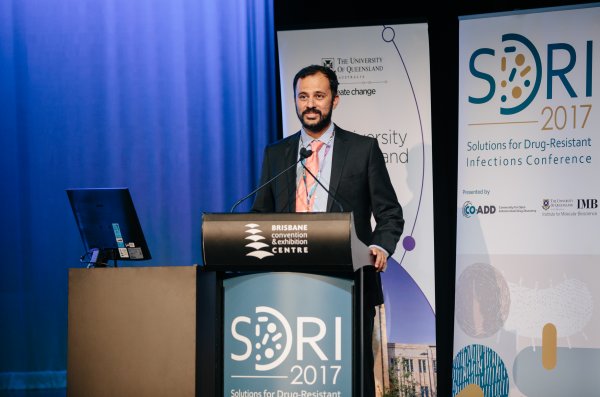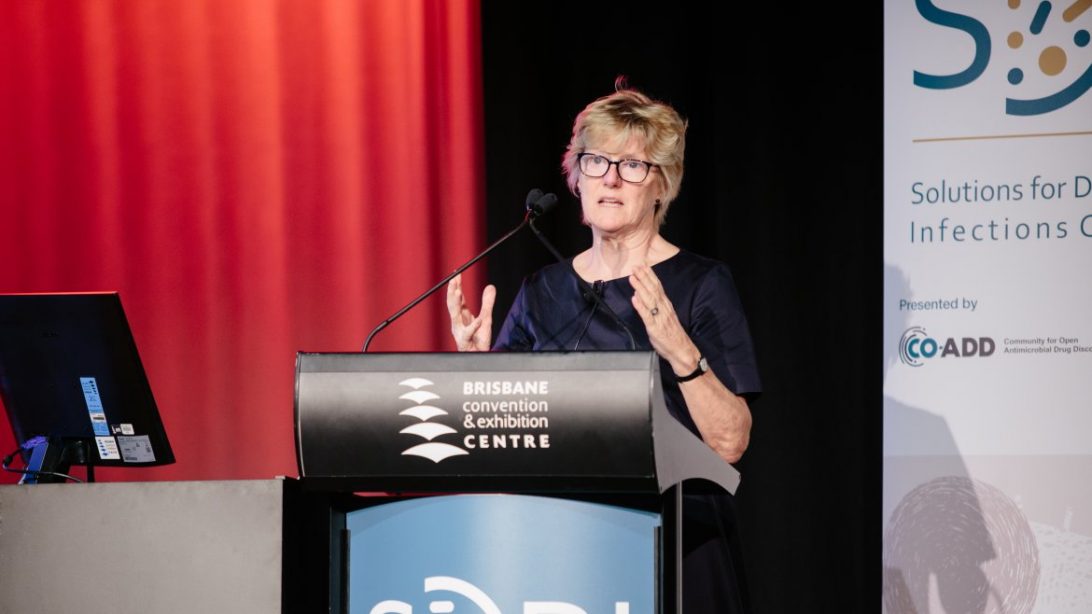“Bacteria do not respect borders” – notes from the SDRI 2017 conference
19 Apr 2017
Written by Emma Ceccato
Many countries have developed reports and plans to tackle the problem of antimicrobial resistance (AMR) nationally. In Australia, for instance, the government released a National Antibiotic Resistance Strategy in June 2015, which focuses on communication, antibacterial stewardship, surveillance, international partnerships and a national research agenda to address AMR in the nation.
However, as Professor Dame Sally Davies, Chief Medical Officer for England and member of the Longitude Prize Judging Panel and Committee, (pictured, above) reminded us at the recent Solutions to Drug-Resistant Infections (SDRI 2017) conference, bacteria do not respect borders and more global action is needed to tackle the issue.
Global leaders gather
Earlier this month, global leaders in the AMR space gathered in Brisbane, Australia for the inaugural SDRI 2017 conference, with the aim of setting the agenda for future AMR research and finding much-needed solutions to the worldwide issue of drug-resistant infections.
Over three days, SDRI delegates heard from a range of experts in research, industry, funding and policy in the field of drug-resistant infections.
The conference kicked off with opening speaker Professor Dame Sally Davies, a global advocate for AMR awareness and action, who has successfully put AMR on the global agenda.
“Millions of people across the world are already dying from drug-resistant infections and, if we don’t act now, it will get worse. AMR is an issue that affects every country so we must all act together,” Professor Davies said.
Professor Ramanan Laxminarayan, Director for Centre for Disease Dynamics, Economics & Policy (CDDEP) and Vice-President for Research & Policy at Public Health Foundation of India (PHFI), expanded on this idea during his presentation. Professor Laxminarayan highlighted the importance of uniting in the global fight to control AMR. Reminding delegates that AMR made it to the global stage at the United Nations General Assembly, he stressed that we now need to put these plans into practice.
Call for effective diagnostics
The need to develop more efficient and effective diagnostics was cited as an important priority for AMR research. Researchers from The University of Queensland’s Institute of Molecular Bioscience (IMB) have recently launched the Centre for Superbug Solutions to help address this need. (Diagnostics is also the focus of the Longitude Prize).
IMB’s Centre for Superbug Solutions aims to help doctors accurately diagnose and treat multi-drug-resistant bacterial infections. The centre focuses on developing effective ways to better diagnose, track, and treat drug-resistant infections. Over the last two years, the diagnostic team have used cutting-edge Oxford Nanotechnologies sequencing devices to sequence bacterial genomes and understand how antibiotic resistance develops. The team’s new approach to helping researchers piece together the puzzle of antibiotic resistance was published in Nature Communications earlier this year.
Setting the global agenda for drug-resistant infections research
On the final day of SDRI 2017, a panel of experts discussed the status of drug-resistance research and, with the help of SDRI delegates, decided on three priorities for researchers to focus on in the future to tackle AMR. Panel members included Professor Dame Sally Davies, Jennifer Leeds (Novartis), Zuoyu Xu (NIH), John Rex (CARB-X and Wellcome Trust) and scientific committee members Matthew Cooper and Liz Harry.
Many themes were proposed, including improving public health, using a multi-disciplinary approach to research, and improving antimicrobial stewardship. Live voting from SDRI delegates during the discussion led to the final list of research priorities that needed the most attention:
- Novel antimicrobial drug discovery
- Education, outreach and awareness of drug-resistant infections
- New funding models
SDRI 2017 was successful in helping to set the agenda for AMR research going forward. The strong call for action that emerged from the meeting cannot be ignored. Collaboration in the AMR community in research, policy, and industry is critical to address the threat of global drug-resistance.


